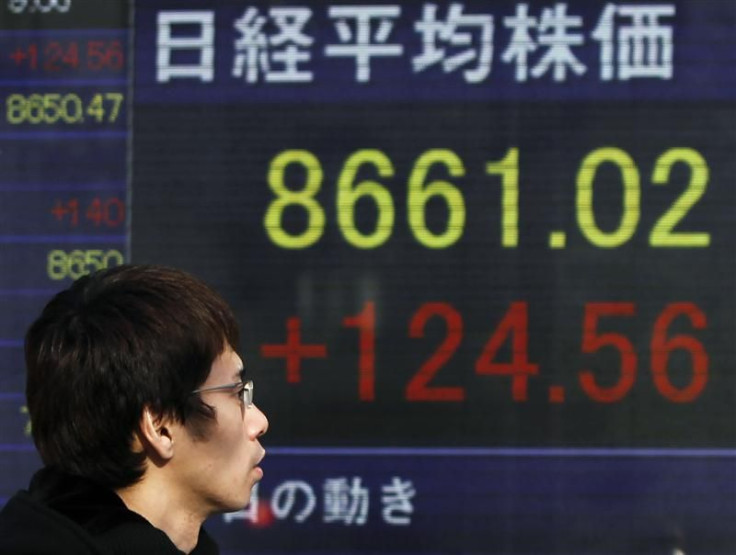Japan's Nikkei Closes Higher

(REUTERS) -- Japan's Nikkei average edged higher on Tuesday and recovered its footing after better-than-expected Chinese economic data and solid demand at a French treasury bill auction reassured investors in the wake of European debt downgrades.
Construction and engineering firms .ICNST.T extended gains and the sector rose 3.1 percent as investors bought stocks most likely to benefit from reconstruction spending after last March's tsunami and earthquake.
Obayashi Corp (1802.T), Shimizu Corp (1803.T) and Kajima Corp (1812.T) advanced between 3 and 3.6 percent, while among general contractors Tobishima Corp (1805.T) shot up 37.5 percent and Daisue Construction (1814.T) ended up 57.8 percent.
Most, if not all, of the 100 or so companies on the top gainers' list are involved in construction or reconstruction-related industries like cement and other materials, said Fumiyuki Nakanishi, general manager in the investment and research department at SMBC Friends Securities.
It's difficult to buy with nagging worries about Europe still in the background, but small-cap reconstruction-related stocks seem to be the sole winners.
The construction sector has risen 7.2 percent so far this year compared to a flat Topix index .TOPX.
The benchmark .N225 gained 1.1 percent to 8,466.40 on Tuesday, breaking above its 25-day moving average near 8,457, while the broader Topix .TOPX added 0.9 percent to 731.53.
Cement and road companies were big winners, with Japan Bridge Corp (5912.T) soaring 15.9 percent, taking its gains to more than 205 percent this month, while Sumitomo Osaka Cement Co Ltd (5232.T) jumped 4.6 percent.
The government is basically driving around in a taxi and throwing money out of the window, said Nicholas Smith, Japan strategist at CLSA, referring to extra budgets for the financial year to March 31.
The government has already allocated 19 trillion yen ($248 billion) of spending. They are debating about a supplementary budget of 2.5 trillion yen ... We have got the money but we just have to decide where to spend it now. It's an absolutely delicious situation.
Industrial robot maker Fanuc Corp (6954.T) was the top gainer in the Nikkei by weighting, rising 3.2 percent after data showed 8.9 percent growth in China's GDP in the latest quarter, slightly stronger than the 8.7 percent consensus of economists polled by Reuters.
RISK-OFF
Despite positive signs from the construction sector, market participants said the benchmark will not climb higher in the absence of real progress in Europe.
For the Nikkei to make real gains, it needs investors to return to the market. Globally, investors are not returning to equities until there is a clear roadmap in solving the sovereign debt crisis in Europe, said Yoshihiro Ito, chief strategist of Okasan Online Securities.
On Monday, the Bank of Japan helped prop up Japan's market by buying 18.8 billion yen ($245 million) worth of exchange-traded funds after rating firm Standard & Poor's cut the credit rating of nine euro zone countries, including France.
The only people buying and holding Japanese shares in this environment are public funds, said Kenichi Hirano, operating officer at Tachibana Securities.
Panasonic Corp (6752.T) lost 0.8 percent to 611 yen, its lowest since at least 1984, after Citigroup cut the consumer electronics maker's target price to 670 yen from 780 yen last week and said the company has little hope of near-term recovery.
Nomura analysts recommended investors to go short on the electrical appliance and precision instruments segment, however, and long on the steel and nonferrous metals sector.
They said in a report that the weaker euro was behind their decision to put electrical appliances and precision instruments on the short sector candidate list.
On the other hand, concerns about China's economy, weakening international commodity prices and steel oversupply in East Asia that had weighed on the steel and nonferrous metals sector have eased somewhat, they said.
Trading volume was moderate, with 1.76 billion shares changing hands on the main board, up from 1.35 billion shares on Monday.
Advancing shares totaled 995, against 505 that fell.
© Copyright Thomson Reuters {{Year}}. All rights reserved.






















